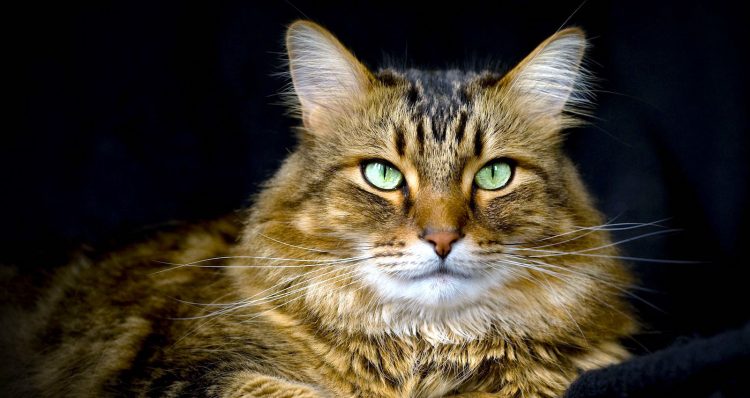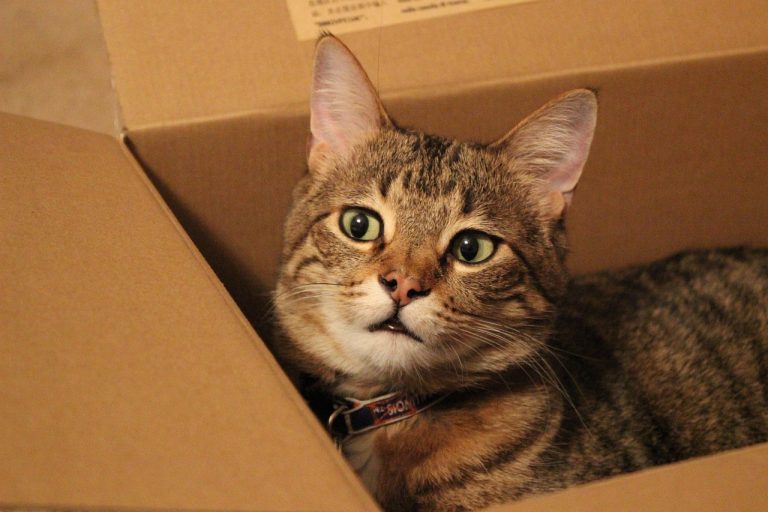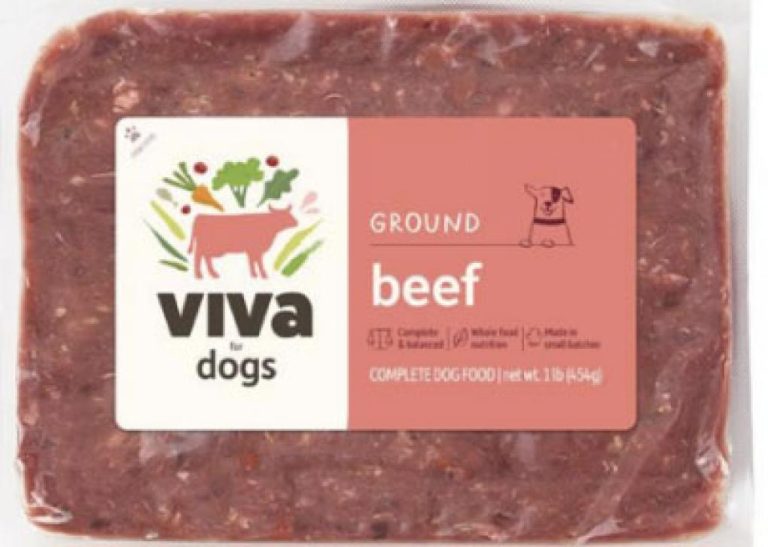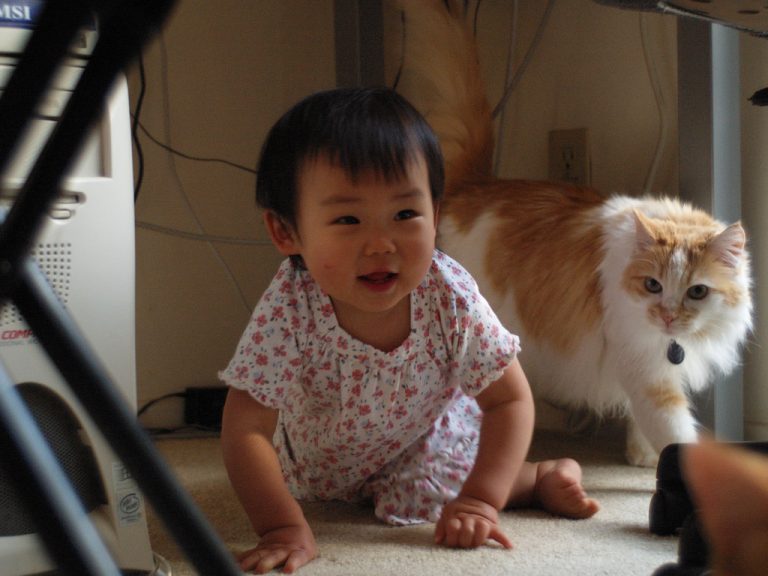Maine Coons: The Majestic Giants of the Cat World
This is an affectionate cat who gets along well with kids and other animals.

- Key Characteristics of Maine Coon Cats
- Where Maine Coon Cats Came From
- Recognizing a Purebred Maine Coon
- How Friendly Are Maine Coon Cats?
- Are Maine Coons Right Cat for You?
- Where to Adopt a Maine Coon Cat
- Popular Myths and Legends Surrounding Maine Coon Cats
- Additional Resources
- Frequently Asked Questions (FAQ)
Don’t Guess When It Comes To Your Pet’s Care


Don’t Guess When It Comes To Your Pet’s Care
Key Characteristics of Maine Coon Cats
- Weight: 13–18 pounds (males); 8–12 pounds (females)
- Life Expectancy: 10–15 years
Maine Coons are tall, muscular cats with long, fluffy tails resembling a plume. Their heavy, glossy coats and big, round paws make them well-suited for enduring harsh winter climates. With large eyes and ears, these cats often have ear tips resembling a lynx.
Maine Coons come in a multitude of colors and have unique rings of color throughout their fur, giving them markings that resemble those of a raccoon.
Where Maine Coon Cats Came From
The origin of the Maine Coon is shrouded in mystery, with several theories about how this beautiful cat came to exist in North America:
- One theory is that the cats were brought over with the belongings of Marie Antoinette, who did not make the follow-up trip. The cats were freed and proved to be avid hunters.
- Another theory involves an English sea captain, Captain Coon, who commanded a trading ship. The ship’s cats may have mated with local cats in many areas along the New England coastline.
Regardless of these and other theories, the origin of the Maine Coon cat breed remains debatable. The Maine Coon also has the distinction of being chosen as the best cat at the very first cat show in the United States.
Recognizing a Purebred Maine Coon
- Purebred Maine Coons have large, muscular bodies and tufted ears.
- Their bushy tails and large, expressive eyes give them a gentle, inquisitive look.
- The Maine Coon’s coat is heavy and glossy with a double layer:
- A soft undercoat
- A longer, water-resistant top layer
- Distinctive ruffs of fur around their necks resemble a lion’s mane.
- Certification or documentation from recognized breeders or cat associations can confirm a purebred Maine Coon.

How Friendly Are Maine Coon Cats?
Maine Coons are extremely friendly cats who get along well with adults, children, other cats, and even dogs. They are intelligent pets with funny personalities and curious natures that thrive when kept indoors.
These cats also prefer companionship, and it’s not unusual for a Maine Coon to need to know where you are at all times.
Are Maine Coons Right Cat for You?
Exercise Needs for Maine Coons
LOW: Maine Coons don’t have any special exercise needs, but you can train them to walk on a leash or harness when they’re outdoors.
- Physical activity similar to most cats:
- Sleeping long hours
- Jumping
- Running
- Playing
- Monitor for decreased activity or mobility, as it may indicate a health problem.

Grooming Needs for Maine Coons
MEDIUM: The Maine Coon’s glossy, heavy coat has two layers and can easily mat if neglected. Regular brushing is essential.
- If mats are difficult to remove, consider a lion cut:
- Shaves the body, leaving fur at the head, tail, and paws
- Additional grooming tips:
- Trim the cat’s nails
- Brush your cat’s teeth regularly
- Maine Coons may even tolerate baths

Health Problems for Maine Coons
MEDIUM: Maine Coons are fairly healthy cats but are susceptible to issues that affect other cats and can be passed down in breeding:
- Hypertrophic cardiomyopathy thickens the heart walls and restricts blood flow. Symptoms are rare but may include weight changes, difficulty breathing or an irregular heartbeat.
- Spinal muscular atrophy appears in kittens as rear-end lameness and is genetically inherited. This condition may limit cats’ activity, but the cats can still lead normal, healthy lives. Breeders can test their cats and avoid breeding those with this genetic marker.
- Polycystic kidney disease occurs when cysts appear on the kidneys. The rate of growth of the cysts varies, usually resulting in kidney failure. But the good news is that treatment is available. Consult your vet if you notice increased fluid intake, excessive urination, decreased activity, weight changes or vomiting in your Maine Coon.
- Hip dysplasia in cats occurs when the hip joint is out of whack, leading to pain and arthritis, and can increase as the cat grows and gains weight. Look for limping or decreased activity as a symptom. Testing can determine if the parents are experiencing this condition or are carriers who will pass it to their offspring.
Learn more about Maine Coons from this video:
Where to Adopt a Maine Coon Cat
If you’re considering a Maine Coon for your next pet, check adoption resources first— even purebred animals end up in shelters.
- Try Petful’s online cat adoption search or your local animal shelters and rescues.
- If purchasing from a breeder, do thorough research and ask plenty of questions to avoid supporting a kitten mill.
Popular Myths and Legends Surrounding Maine Coon Cats
- A common myth is that Maine Coons are a crossbreed between domestic cats and raccoons, inspired by their raccoon-like markings and bushy tails.
- Another legend claims Maine Coons are descendants of long-haired cats owned by Marie Antoinette, brought to America during her failed escape.
- These myths, although unfounded, contribute to the unique allure and fascination surrounding Maine Coon cats.
Additional Resources
- “Welcome to Maine Coon Cat Nation.” Maine Coon Cat Nation. http://www.maine-coon-cat-nation.com/index.html
- “Maine Coon Cats and Kittens.” Petfinder. https://www.petfinder.com/cats-and-kittens/breeds/maine-coon-cats-kittens/
- “Maine Coon Cat.” CFA. https://cfa.org/breed/maine-coon-cat/
- “Maine Coon: Official State Cat of Maine.” Maine.gov. https://www.maine.gov/sos/kids/about/symbols/cats
Frequently Asked Questions (FAQ)
How long do Maine Coons live?
Maine Coons typically live between 10 to 15 years.
How much are Maine Coons?
The cost of a Maine Coon can range from $800 to $2,000, depending on the breeder and location.
How big do Maine Coons get?
Maine Coons can grow up to 40 inches in length and weigh between 8 to 18 pounds, with some males reaching up to 25 pounds.
When do Maine Coons stop growing?
Maine Coons usually stop growing between 3 to 5 years of age.








